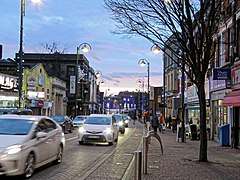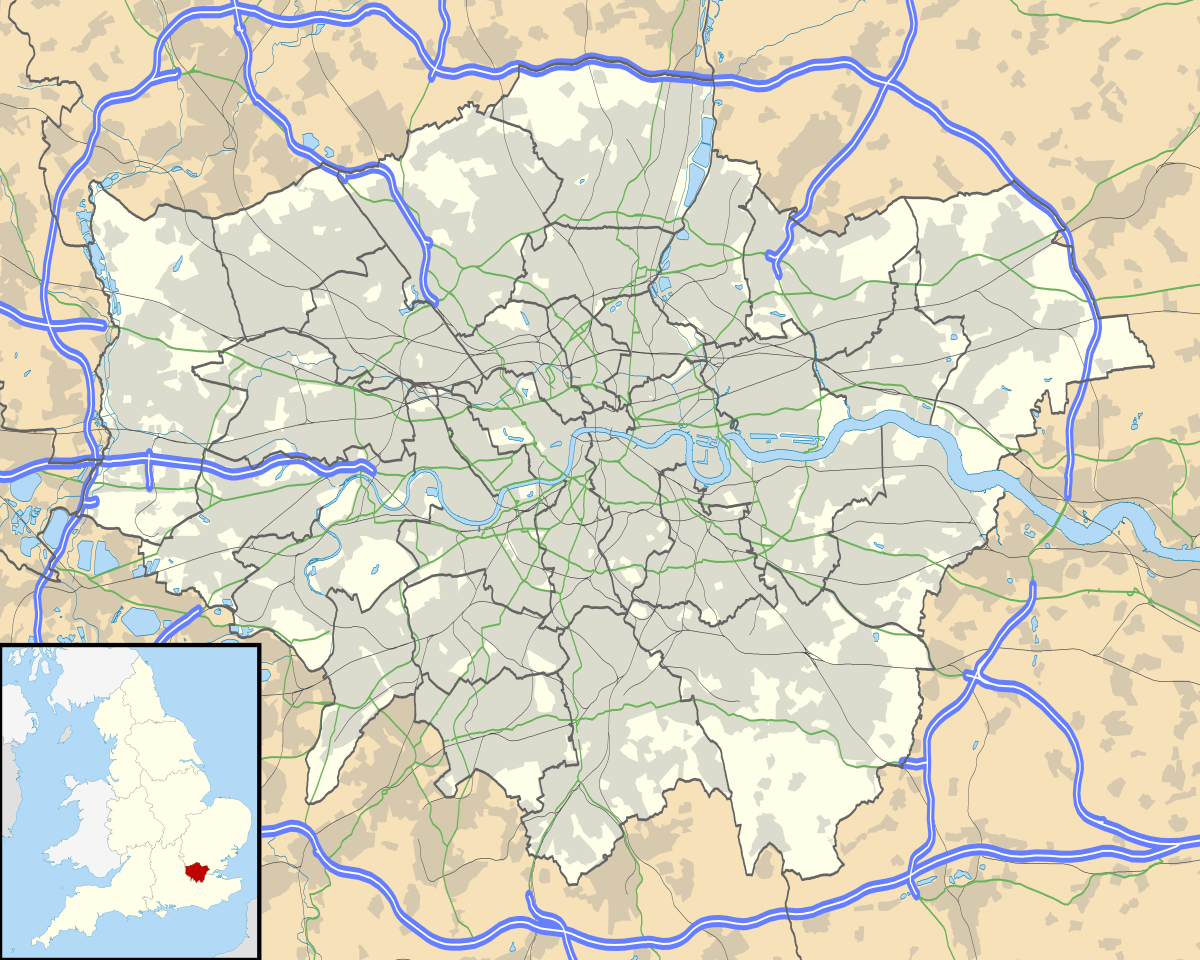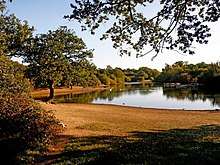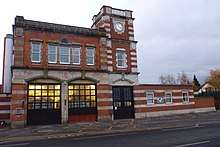Leytonstone
Leytonstone /ˈleɪtənˌstoʊn/ is an area of East London, and part of the London Borough of Waltham Forest. It is a suburban area, located seven miles north-east of Charing Cross in Greater London. It borders Walthamstow to the north-west, Wanstead (in the London Borough of Redbridge) to the east, Stratford and Leyton to the south west and west respectively, and Forest Gate (in the London Borough of Newham) to the south. The area is served by Leytonstone tube station on the Central line & Leytonstone High Road on London Overground's Gospel Oak to Barking line. The northern end of Leytonstone High Road, beside Wanstead Flats, is known as Bushwood.
| Leytonstone | |
|---|---|
 Leytonstone High Road | |
 Leytonstone Location within Greater London | |
| Population | 12,879 (2011 Census. Ward)[1] |
| OS grid reference | TQ3987 |
| London borough | |
| Ceremonial county | Greater London |
| Region | |
| Country | England |
| Sovereign state | United Kingdom |
| Post town | LONDON |
| Postcode district | E11 E15 |
| Dialling code | 020 |
| Police | Metropolitan |
| Fire | London |
| Ambulance | London |
| UK Parliament | |
| London Assembly | |
History

Origins and Roman milestone
The main thoroughfare, Leytonstone High Road, is part of an ancient highway from Epping to London, on the borders of Epping Forest. A small hamlet at Leytonstone has existed since the early 14th century, when it formed part of the parish of Leyton in the county of Essex. The name Leytonstone was originally ‘Leyton-atte-Stone' and comes from a distance marker called the "High Stone". The High Stone, which stands at the junction of Hollybush Hill (the A1199 road from Woodford) and New Wanstead (the A113 road from Woodford Bridge), near the eastern boundary of the parish, is a restored 18th-century obelisk set up on an earlier stump, which has been traditionally described as a Roman milestone, possibly marking an extension of the Roman road from Dunmow to Chigwell into London.[2] Two of the obelisk's inscriptions are still just legible: others are not:
- "To Epping XI Miles through Woodford, Loughton"
- "To Ongar XV Miles through Woodford Bridge, Chigwell, Abridge"
Other Roman archaeological features have been found in the Leyton area. "There was a Roman cemetery south of Blind Lane, and massive foundations of some Roman building, with quantities of Roman brick, were discovered in the grounds of Leyton Grange."[3]
18th century
In 1722, author Daniel Defoe travelled through "Layton-stone, a place by some known, now as much, by the sign of the Green-Man". Leytonstone was one of the villages, along with Stratford, Leyton and Woodford which Defoe described as being desirable country retreats for wealthy merchants and financiers, within an easy ride of the City.[4]
19th century
Leytonstone remained largely rural until the opening of the railway at Leytonstone station in 1856, which gave quick and easy access to Stratford and central London. This, combined with the increased availability of office and industrial work had transformed the area into a suburban dormitory town by the end of the 19th century.

However, the forest land in the north and east of Leytonstone escaped development following a prolonged public campaign, when the Epping Forest Act 1878 preserved more than 200 acres (80 hectares) of open space for public use.[2]
In 1898 the department store, Bearmans was opened by Frank Bearman. Selling furniture and clothing it was the first store outside central London to have an escalator.
20th century
In the 1960s there was a problem of congestion around the shopping streets in Leytonstone,[2] so a one way system was introduced. In the 1990s the M11 link road was built through the area despite a long-running protest by locals and road protestors. This and other protests led to the policy, Roads for Prosperity, being abandoned.[5]
Governance
Leytonstone was part of the ancient parish of Leyton in the Becontree Hundred of Essex. For ecclesiastical purposes it constituted a separate parish from 1845.[6] The parish of Leyton formed part of the West Ham Poor law union. In 1894 it became part of the Leyton Urban District, which was incorporated in 1926 as the Municipal Borough of Leyton. Leytonstone became part of the London Borough of Waltham Forest in 1965 upon the creation of Greater London.[7] Within the borough, Leytonstone is represented by four council wards, each with three councillors. The wards are: Forest ward (Whipps Cross area, parts of Upper Leytonstone as far as Grove Green), Leytonstone ward (the rest of Upper Leytonstone, the town centre, Bushwood and Ferndale areas), Cathall ward and Cann Hall ward (South Leytonstone areas).[8]
The area is part of the Leyton and Wanstead constituency. As of May 2010, John Cryer has held the seat for the Labour Party. For elections to the London Assembly it is part of the North East constituency and the AM is Jennette Arnold of the Labour Party.[8]
Transport
Leytonstone tube station is in Zone 3 on the Central line of the London Underground, and serves as the last stop before the line splits into two, dividing into the Fairlop Loop and the branch out to Epping (Zone 6). Since 2016, night tube trains run on Friday and Saturdays on the Central line, approximately every 10 minutes between White City and Leytonstone.[9] A series of tiled mosaics commemorating local director, Alfred Hitchcock, line the entrance passages to the tube station.[10]
Leytonstone High Road is a separate London Overground railway station, some 10 mins walk from the tube station, serving the line known colloquially as the GoBlin (Gospel Oak to Barking). In 2017-18, the line was electrified, ready for the introduction, by the end of 2018, of new longer trains offering an additional 30 per cent capacity. These were not introduced until mid-2019.
Leytonstone bus station is located either side of Leytonstone tube station. Buses include 257 to Stratford, W15 to Hackney as well as the night bus N8 to Tottenham Court Road.
At the southern end of Leytonstone lies Maryland railway station – soon to be a Crossrail station, with works to prepare the station for Elizabeth Line services set to complete in summer 2018. This section of the Elizabeth Line between Shenfield in Essex and Liverpool Street is due to begin operating in late 2021- early 2022.
Leytonstone is located close to the foot of the M11 motorway to Cambridge but within the ring formed by the North Circular and South Circular Roads. The Mayor of London has announced that the capital’s Ultra-Low Emission Zone (ULEZ) will be expanded up to the North and South Circular boundary in 2021.[11]
Education
Leytonstone schools include:
- Davies Lane Primary School. First opened in 1901 as a boarding school. In 1948 it became a junior and infants school, merging into a single primary in 2004. One of its most famous old boys is the TV chat show host, Jonathon Ross. In 2014 it was rated Outstanding by Ofsted.
- George Tomlinson Primary School
- Gwyn Jones Primary School
- Mayville Primary School
- Buxton School, an all-through school for ages 3–16 and Specialist Science College
- Connaught School for Girls, a specialist Language school
- Leytonstone School, a specialist Business and Enterprise school
- Norlington School for Boys, a specialist Maths and ICT school
Notable features
- St John the Baptist's Church, Leytonstone – Grade II listed. Built in 1832 and consecrated in 1833, landmark church at junction of High Road Leytonstone and Church Lane.[12] The churchyard is host to the regular vintage Stones Throw Market and Hitchcock's Home screenings [13] of Alfred Hitchcock Films on 30 ft outdoor screen as part of the annual Leytonstone Festival.
 The Temple, Wanstead Park
The Temple, Wanstead Park - St Andrew's Church, Leytonstone, also Grade II listed, built between 1886 and 1893 as memorial to local philanthropist William Cotton and designed by Sir Arthur Blomfield.
- Wanstead Park lies to the eastern border. The former grounds of Wanstead House, it includes ornamental lakes, a Temple style folly and grotto.
- Epping Forest boundaries reach Leytonstone in wooded areas called Hollow Ponds and Wanstead Flats.

- Leytonstone House, 18th century former home of Sir Edward Buxton, a former MP and conservationist who, with his brother, played a major part in protecting Epping, Hainault and Hatfield forests. Grade II Listed building. From 1868–1936 Bethnal Green School for the juvenile poor
- Leytonstone Library – Grade II* listed art deco building, built in 1934 to the design of James Ambrose Dartnall. Listed in 2014. Underwent £1.5M refurbishment which completed in 2015.[14]
- Whipps Cross University Hospital
- Dagenham & Redbridge football club, currently a professional Sky Bet League Two team, is an amalgamation of several amateur football clubs, including Leytonstone F.C., who played along Leytonstone High Road. The Wanderers F.C. also originated from Leytonstone but played in several other venues round London.
Public services
Thames Water supplies Leytonstones' water. EDF Energy Networks is the Distribution network operator licensed to distribute electricity from the transmission grid to homes and businesses in Leytonstone.

Whipps Cross University Hospital, on Whipps Cross road, is a University Hospital administrated by Whipps Cross University Hospital NHS Trust. London Ambulance Service responds to medical emergencies in Leytonstone. Home Office policing in Leytonstone is provided by the Metropolitan Police Service.
Statutory emergency fire service is provided by the London Fire Brigade, with Leytonstone Fire Station on Leytonstone High Road. The original Victorian building which housed the Leytonstone Fire Station was knocked down in 2014 and its new replacement opened in February 2016.
Sports
Leytonstone is home to the North Star Velo cycling club. 5K Parkruns take place in Wanstead Flats every week.
Overseen by City of London Corporation, 60 football pitches – including 8 full size – are located on Wanstead Flats and amateur football teams from Leytonstone play every Sunday.
Leytonstone Leisure Centre in Cathall Road, consists of a state-of-the-art gym on 2 floors, 25m main pool, teaching pool, 2 badminton court sports halls, fitness class studios, an indoor soft play area for under 6's.[15]
Leytonstone was home to former association football team Leytonstone F.C. before they merged with Redbridge Forest F.C.. They last played in the Isthmian League during the 1978–79 season.
Notable people
.jpg)
- Damon Albarn, singer-songwriter and musician, born in Fillebrook Road, Leytonstone. A blue plaque was erected in 2014. In the same year he performed an impromptu performance of Parklife at the Red Lion pub in Leytonstone High Road.[16]
- Eric Ashby, Baron Ashby, botanist, born in Leytonstone in 1904
- Roger Ashton-Griffiths, actor
- David Bailey CBE, photographer, born in Leytonstone
- Reginald Poynton Baker, movie producer; father of Conservative MP Peter Baker
- Ashley Banjo, dancer and choreographer, was born in Leytonstone
- David Beckham OBE, footballer (England); he was born in Leytonstone and grew up in Chingford
- Reginald Horace Blyth, author and orientalist
- Alan Booth, travel writer[17]
- Edward North Buxton, conservationist and liberal politician 1840–1924.
- Cornelius Cardew, composer
.jpg)
- Carly Cole, model, fitness trainer and wife of footballer Joe Cole
- Fanny Cradock, TV chef and cookery writer, born in Fairlop Road, Leytonstone[18]
- Curtis Davies, footballer
- Cartrain, artist
- Frank Dobson, sculptor, lived in Cobden Road as a teenager in 1901
- John Drinkwater, poet and dramatist, born in Leytonstone in 1882
- Charles Eade, journalist, born in Leytonstone in 1903
- Eamon Everall, artist and educator
- Ken Farnes, cricketer
- Henry Charles Fehr, sculptor, lived and worked in Leytonstone, 1886–1891[19]
- Harris Dickinson, actor
- Joanne Fenn, athlete
- Stuart Freeborn, film make-up artist, born in Grove Green Road in 1914
- Graham Gooch OBE, cricketer, former captain of the England cricket team
- Steve Harris, founder and bassist of the band Iron Maiden
.jpg)
.jpg)
- Sir Alfred Hitchcock, film director, born and raised in the area; the entrance to Leytonstone tube station has a number of mosaics depicting scenes from his films. Adjacent to the site of his birth at 517 Leytonstone High Road, the building has been painted with a large mural of birds which are repeated in the pavement outside as a nod to Hitchcock's famous film, The Birds. The pub at 692 Leytonstone High Road was similarly renamed "The Birds" in his honour
- Tom Hood, humourist and playwright
- Sydney Horler, novelist
- Gavin Hoyte, footballer
- Justin Hoyte, footballer
- Sir Derek Jacobi CBE, actor
- Jammer, record producer
- Colin Kazim-Richards, footballer
- Lucy Kirkwood, playwright
- Don Law, record producer
- Natasha Little, actress
- Seán Mac Stíofáin, chief-of-staff of the Provisional IRA
- Sir Morell Mackenzie, physician
- Colin Matthews, composer
- Dominic McVey, Britain's youngest self-made millionaire
- Jozef Piłsudski, Polish statesman stayed with the Wasilewski family (see below) while on the run from Russia in the early 1900s
- Jamie Porter, cricketer
- Redzz, rapper, actor, songwriter and musician
- Tony Robinson, comedian and broadcaster
- Jonathan and Paul Ross
- June Sarpong MBE, television presenter
- Rita Simons, actress, singer and model
- Talvin Singh, musician
- Adam Smith, footballer
- Bob and Roberta Smith, artists, writers, musicians
- Harold Spurr, English cricketer
- Andros Townsend, footballer
- Halszka Wasilewska, daughter of Leon Wasilewski spent her infancy in the area. She fought in 3 wars and became a decorated major in the Polish Armed Forces
- Leon Wasilewski, Polish political activist and editor lived there 1898–1903
- Douglas Webb, photographer
In drama, film and television
- In The Bed-Sitting Room (1969), Spike Milligan created the (fictional) closest heir to the British throne after the outbreak of nuclear war as "Mrs. Ethel Shroake" of 393A High Street, Leytonstone. She appears in the final scene of the play.
- Deep End, a 1970 horror film, was partly shot at the old Cathall Road Baths in Leytonstone.[20]
- Small Potatoes was a 1999 TV sitcom made by Hat Trick Productions for Channel 4, about the young manager of a video shop in Leytonstone.[21]
- I Proud to Be an Indian was a 2004 Bollywood film, about an Indian family in late 1970s Leytonstone terrorised by skinheads.
- In EastEnders, Kim Fox is from Leytonstone.
See also
References
- "Waltham Forest Ward population 2011". Neighbourhood Statistics. Office for National Statistics. Retrieved 19 October 2016.
- Powell, W. R. (1973). "A History of the County of Essex". British History Online. pp 174–184, Leyton: Introduction. Retrieved 26 March 2018.
- Kennedy, J. A History of the Parish of Leyton, Essex Phelp Brothers, Leyton (1894), digital copy at archive.org
- Defoe, Daniel (1722), A tour thro' the whole island of Great Britain, divided into circuits or journies (Volume I, Letter I)
- Lean, Geoffrey (21 January 1996). "Tories ditch the 'car economy'". The Independent. London. Retrieved 7 May 2010.
- Hibbert, Christopher (2008). London Encyclopaedia. Macmillan London Ltd. pp. 482–483. ISBN 978-1-4050-4924-5.
- Powell, W. R., ed. (1973). A History of the County of Essex: Volume 6. London: Victoria County History. pp. 205–214. ISBN 978-0197227190.
- "Leytonstone Democracy". leytonstonetoday.net. L D Horton. Retrieved 22 June 2020.
- Matters, Transport for London | Every Journey. "The Night Tube". Transport for London. Retrieved 29 April 2017.
- "Alfred Hitchcock Tile Murals in Tube Station".
- "Mayor Of London Press Release ULEZ (low emission zone) expansion to expand up to North and South Circular".
- "Welcome to St Johns". www.stjohns-leytonstone.org.uk. Retrieved 29 April 2017.
- "Hitchcock's Home – Leytonstoner".
- "East London Guardian – History: The Leytonstone Library that became 'a symbol of freedom and democracy' in war propaganda". East London Guardian.
- "Leytonstone Leisure Centre".
- "BBC Damon Albarn sings Park Life In Red Lion Pub, Leytonstone".
- "Alan Booth". The Times (64580). 1 March 1993. p. 19.
- "Blue Plaque – Fanny Craddock".
- "Famous people who came from our area". www.leytonpast.info. Leyton & Leytonstone Historical Society. Retrieved 26 March 2018.
- Deep End filming locations at IMDb
- Hat Trick Productions: Small Potatoes
External links
| Wikimedia Commons has media related to Leytonstone. |
- The Leytonstoner – a community news magazine and review website
- Leytonstone Arts Trail – annual arts event in Leytonstone
- Woodhouse Players – an amateur drama group located in Leytonstone
- Bushwood Area Residents' Association BARA – neighbourhood group for the Bushwood Area of Leytonstone
- Ferndale Area Residents' Association FARA – neighbourhood group for the Ferndale Area of Leytonstone
- Forest Residents' Association Leytonstone FORA – neighbourhood group for the Forest Area of Upper Leytonstone
- – a Leytonstone community website
- The Leytonstone War Memorial Project
- The Friends of Wanstead Parkland – Wanstead Parklands, expansive green space adjacent to Leytonstone
- Archives relating to Leytonstone at The National Archives (United Kingdom)
